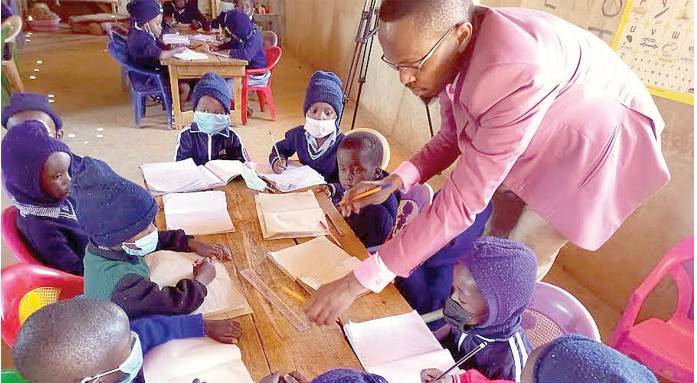Male ECDE teacher battles distrust to find joy in profession

Teaching kindergarten children has always been a preserve of female teachers with men largely avoiding the profession.
However, Dennis Njomo has overcome stereotype to become one among few male Early Childhood Development Education (ECDE) teachers, a job he has done for the past three years.
Njomo is currently teaching at Kabwe ECDE Centre in Kiharu, Murang’a county, after he was deployed by the county government in 2019.
He says he has always been passionate about teaching the little children and he would not take any other career.
However, when he declared his ambition to his close friends and family, it was almost impossible for the to imagine him as a pre-school teacher.
“I lost a number of friends after I joined ECDE teaching because they felt this is a profession preserved for female teachers and not men, but I was determined to prove them wrong,” he says.
Prior to joining Kabwe ECDE, he taught at Gathukiini, Gaitheri, Gakoe and Ngechu primary schools where he was contracted by parents, but he was teaching the lower primary classes.
He narrates how parents, teachers and pupils were shocked to see him when he was first posted to the school and were eager to see how he would cope. He says some parents camped in the school to see how he would handle their children.
Though it has not been a smooth sail, he says he enjoys every bit of interacting and teaching children, adding that having a male figure in class creates the much needed balance in the growth of the child.
Njomo says the female teacher he found at the centre retired months after he reported and he had to handle the children all by himself, a task he says, was quite challenging.
“At times the children would soil their clothes, but I could only handle the boys, bath them and dress them in the spare uniform they had brought to school,” he said.
“I would seek the assistance of a female colleague in Grade One, to help me clean up the girls if they messed up after which I would wash their uniform and pack it in their bag to take home in the evening,” he adds.
He urges the society to embrace people like him who take the seemingly odd jobs saying some people still push him to abandon this work.
“Sometimes when I go to gatherings and introduce myself as a nursery school teacher, people laugh at me, but this does not dampen my spirit” he added.
Njomo who has a certificate in ECDE training says he is pursing a diploma to upgrade his education and perfect his skills in dealing with the children.
Michael Muchoki, the headteacher Kabwe Primary School also admits that he was surprised to see a male kindergarten teacher posted to his school, but he has come to appreciate his role in the children’s development overtime. He says he can tell the difference between the children that Njomo has taught and those handled by teachers before him.
Outstanding teacher
“Njomo is a dedicated teacher and given he is conversant with the new Competency-Based Curriculum (CBC), he has been giving the best to the ECDE children,” he poses.
Catherine Njeri one of the ECDE parents says her Pre-Primary One (PP1) child is always excited to go to school, which she attributes to good relationship with teacher Njomo.
Njeri says her daughter is able to capture all she learns in class and she is able to tell it all when she gets home in the evening. “My daughter loves the teacher so much and she cannot afford to miss school unless she is sick,” remarks Njeri.
Grace Njoroge, the ECDE coordinator, Murang’a East says there are only two male nursery school teachers in the entire sub-county.
Njoroge says Njomo is an outstanding teacher who is doing an excellent job in moulding the young children.
“He is passionate about his work and there is not even a single time I have received a complain about him,” she says.
Njoroge urged young men not to shy away from taking up such careers saying job opportunities are always open for both male and female teachers.
Child psychologists Susan Kinyua says having male teachers in nursery schools can have an impact on young children whose conceptions of gender roles and identity are rapidly forming.
“Research has found that having access to diverse teachers is beneficial for children. For the youngest learners, it means they are more likely to get exposed to different varieties of play and communication, and helps them develop healthy ideas around gender,” she says.
She also states that there is something about being around a male adult in a classroom of young children that changes the traditional dynamic. “There is a noticeable difference in the child who does not have a father figure, as well. I have experienced this from both boys and girls. They long for the attention and affection, and I can give that in a constructive way,” she offers.
Susan quotes a recent global survey, The Hechinger Report, a national nonprofit newsroom that reports on education, which states that despite mostly feeling supported by colleagues and family members, many of the male educators reported facing societal barriers or cultural resistance in their careers as early education teachers. Some also reported “micro-aggressions and micro-invalidations”, including parents that were surprised, skeptical or concerned that their child had a male teacher.
ECDE National Chairman, Lawrence Otunga, during a past event said county governments across the country have often given preference to female teachers during the hiring of ECDE tutors.
Otunga disclosed that only 10 per cent of ECDE teachers in the country are male, denying the young learners an opportunity to learn from the male gender.
He said male applicants have always been turned away to give room for female teachers who were allegedly considered because they would take care of the learners’ cleanliness. “ECDE teaching entails more than making sure that the children are clean, it involves imparting of knowledge and life skills, which should be best done by teachers from either gender,” Otunga said.
Otunga said that comparatively, more females train for ECDE course compared to men and are, therefore, more likely to dominate the sector.
He encouraged more men to enroll for ECDE training, so that they cannot only change the notion about ECDE being a preserve for women, but also effectively compete with them for the available job opportunities.









